The Big Read: Singapore’s endless love affair with private tuition just got deeper with COVID-19
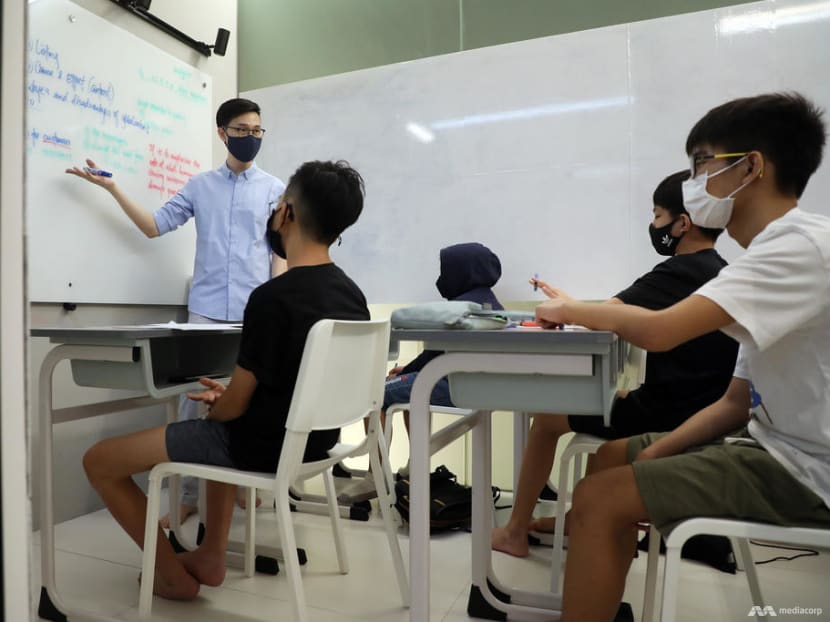
The neverending debate over the pros and cons of private tuition has resurfaced following China’s drastic move recently to ban tutoring for profit in core school subjects. (Photo: TODAY/Ooi Boon Keong)
SINGAPORE: Housewife Santi Choo’s two children briefly had Chinese tuition but by and large, she never believed in sending them for private tuition — not even when her older daughter sat for the Primary School Leaving Examination (PSLE) some years ago.
COVID-19, however, changed all that.
Despite the pandemic causing her husband to lose his job as a project manager in the middle of last year, they decided to spend about S$700 a month from January to hire two home tutors for their younger son, who is taking the PSLE this year, after seeing his maths and science grades plummet last year.
Mrs Choo, 46, blamed her son’s poor performance partly on home-based learning (HBL), which was first introduced when Singapore entered a two-month circuit breaker in April last year amid a sharp spike in Covid-19 cases.
“He thought of it as holidaying at home and took schooling too lightly,” she said.
She was further compelled to seek tuition for the 12-year-old boy after finding it increasingly hard to reach his school teachers.
“Normally, within a day or the following day, the teachers will reply, but nowadays, the replies are a bit slow,” she added.
With her 16-year-old daughter also requesting to have maths tuition, the family’s expenditure on tuition goes up to S$1,500 a month.
This is by no means a small sum for Mrs Choo, who is working part-time at a food stall, while her husband does a mix of odd and contract jobs while searching for permanent work.
Despite their initial lukewarm attitude towards tuition, they believe that it is necessary now as their children just need “some pushing” to excel.
Likewise, even though their household income took a slight hit due to the pandemic, housewife Iris Sim, 40, and her husband spend just more than S$2,000 a month on tuition and enrichment classes for his three children — aged eight, nine and 11 — who attend “brand name” primary schools.
Ms Sim, who will soon return to the workforce after a five-year hiatus to help pay off the children’s tuition expenses, considers the fees a modest sum. The higher-end tuition centres can charge around S$2,000 per child, she pointed out.
“If your child is in a good class in a good school, then most, if not all, of their classmates have tuition in each subject. That is why they got into that class in the first place. That is how they are going to keep up with the pace that the teacher goes in that class,” she added.
Even as teachers are now required to seek approval to give tuition outside of school, following a review of guidelines by the Public Service Division, the pandemic has not only prompted some parents in Singapore such as Mrs Choo to reconsider their stance on tuition, it also seems to have made tuition as indispensable as ever.
Meanwhile, some tuition centres had moved even faster than the schools in coming up with innovative platforms to adapt to the disruptions to school-based learning.
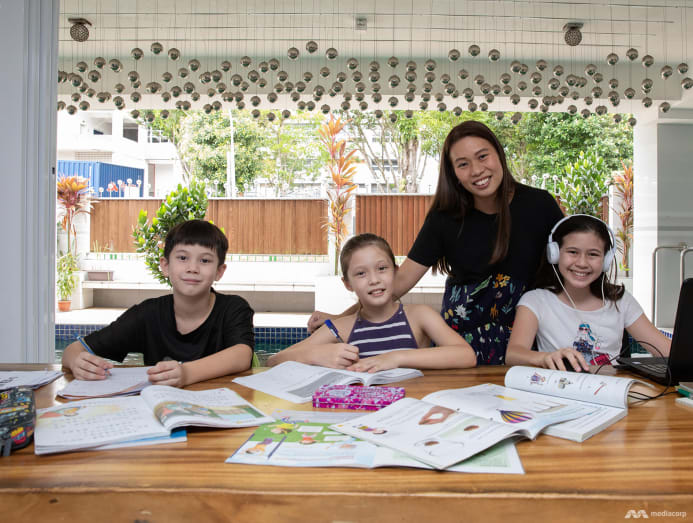
For instance, at SLC School of Language and Communication, the centre which specialises in English and Chinese tuition wasted no time in offering auxiliary “top-up classes” for students who might require additional support on specific areas such as oral or comprehension over teleconferencing app Zoom.
As a result, student enrolment over the past 18 months had grown by 50 per cent, with principal Ben Lee attributing it to the implementation of HBL — particularly in the initial stages when schools and teachers were still new to it.
Between March last year and now, some 15 per cent more students had enrolled with Making Sense, a chemistry and science tuition centre, as it fills the need to “support and hand-hold” pupils who have found it difficult adjusting to online or self-directed learning, said its managing director William Lin.
Dr Gavin Ng, director of Gavin’s Tuition, said enrolment at his centre, which mostly operates over online platforms now following the closure of two of his five outlets, went up from around 450 students to 600.
“There is no point spending on rent now. The definition of space has changed,” said Dr Ng, whose reimagination of online tuition involved working with a logistics firm to bring science experiments to homes and making use of machine learning to track his students’ weaknesses.
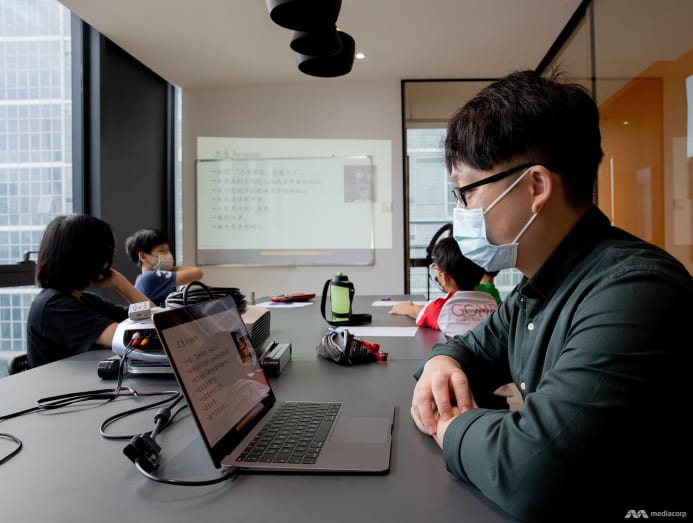
BILLION-DOLLAR INDUSTRY THAT’S STILL GROWING
The neverending debate over the pros and cons of private tuition has resurfaced following China’s drastic move recently to ban tutoring for profit in core school subjects, as well as foreign investment in the sector, in an attempt to make raising children and education more affordable for parents.
The high cost of raising a child in China has contributed to its low birth rates.
The harsh curbs — which threaten to decimate China’s US$100 billion (S$136 billion) private tutoring and online education sector — have led some parents and educators here to question whether Singapore, too, should do more to rein in its own “shadow education industry”. The sector here was worth S$1.4 billion, according to the last Household Expenditure Survey in 2017 and 2018.
Back in 2018, then Education Minister Ong Ye Kung had said the Government had no intention of banning tuition even as he announced a slew of major changes to reduce emphasis on academic grades, such as scrapping mid-year examinations at some levels in both primary and secondary schools.
A ban on tuition would be akin to just treating the symptoms of a rigorous education system, Mr Ong said.
“We can come up with many initiatives to tackle the symptoms… But we hope this (cut in assessments) is a meaningful step to really go a lot deeper for us to soul-search as parents and students and educators (on) what really is a more optimum way of teaching our children, for the joy of learning, to cultivate and nurture curiosity,” he said.
In 2019, Mr Ong reiterated in Parliament that the Government needs the support of parents to shift the culture from turning to tuition as the default option to one where children have the self-confidence and support from their families, schools and peers to manage their learning.
Meanwhile, the tuition industry itself has evolved to keep abreast of the education landscape’s changing needs and demands, education experts and industry players said.
They added that the sector is now dominated by tutoring chains with deep pockets, which are well-equipped to follow the Ministry of Education’s (MOE) mandate to help students “discover the joy of learning” and give their own spin to it.
Take the example of The Learning Lab, which American private equity firm Advent International reportedly bought a significant stake in for around S$300 million in 2014.
The centre was known for its emphasis on getting students into MOE’s Gifted Education Programme (GEP), meant for the intellectually-gifted, and Integrated Programmes (IP), a six-year programme targeted at the top 10 per cent of PSLE students.
In the past five years, the 20-year-old centre has put in place a teaching and learning framework that emphasises “a holistic approach to education, balancing knowledge, skills, and dispositions”, said The Learning Lab’s director of curriculum, Dr Lubna Alsagoff, a former National Institute of Education (NIE) associate professor.
“We use insights from research into learning, pedagogy, and technology to ensure that we do the very best for our students in creating a curriculum that focuses on learning and growth rather than only on performance,” added Dr Alsagoff, who joined the centre in 2017.
Adding that the focus is “academic enrichment”, she said students are taught how to analyse tasks and questions, think about complex problems more deeply and in a systematic way, and learn how to connect what they have learnt with real world situations.
But such tuition courses don’t come cheap.
Today, the monthly regular fees for one subject at The Learning Lab start from S$410 for Primary 1 to 4 students, and S$432 for those in Primary 5 or 6 — up from S$390 and S$400 respectively in 2018. Group tuition typically costs S$30 per hour at the primary level.
Referring to perennial calls to regulate the tuition industry in Singapore, the centre’s chief executive officer Hamilton Lau said: “If framed well, a common set of rules helps to assert standards of quality and drives out less-principled providers and those who are not up to the task.
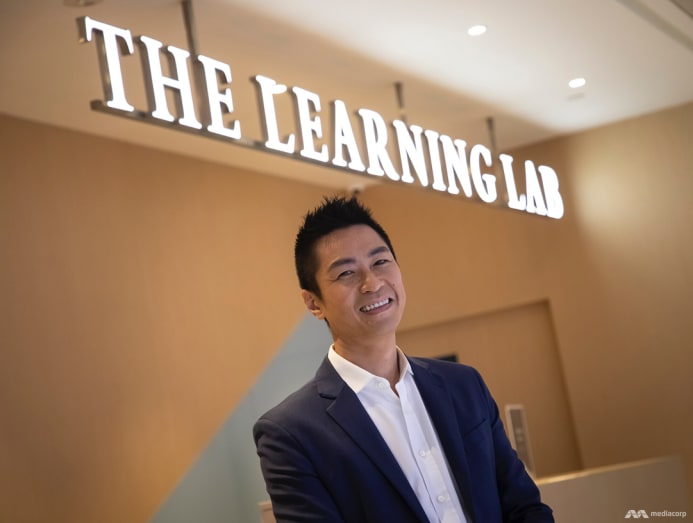
“Perhaps what would be eventually shut down are those centres that are not supportive of the more progressive ethos of the MOE – those that perhaps stick to the outdated methods of teaching through repetitive drill and practice, mechanical memorisation, and regurgitation of information.”
THE MADDENING RACE
Based on MOE’s website, there are more than 800 registered tuition and enrichment centres, up from about 600 five years ago.
As Singapore’s lucrative tuition pie continues to grow, a chunk of it is taken up by an increasing number of centres set up by the former teachers from top schools.
The Physics Cafe, for example, was started in 2010 by former Raffles Junior College physics teacher Dave Sim. It boasts a yearly cohort of 1,000 and has its own lecture theatre, in-house cafe, exclusive study rooms, and even shuttle buses to ferry students to MRT interchanges.
Then, there is Future Academy, which was co-founded seven years ago by Ms Yvonne Chen, a former Raffles Girls’ School and Nan Hua High School teacher, and Mr Lau Hock Soon, a former head of department for maths at Hwa Chong Institution.
The centre, which has about 50 tutors, currently serves 500 to 600 students ranging from the Kindergarten Two to Junior College Two levels, and will soon be opening its third centre. Its class sizes do not exceed 10 students.
Ms Chen said 20 to 30 per cent of the parents who turned to the centre enrolled for its S$3,000-a-year programme that prepares children from as young as Primary One for Direct School Admission (DSA) through the science, mathematics and engineering route.
The programme teaches school topics in advance and students are also prepared to perform in national or international academic competitions.
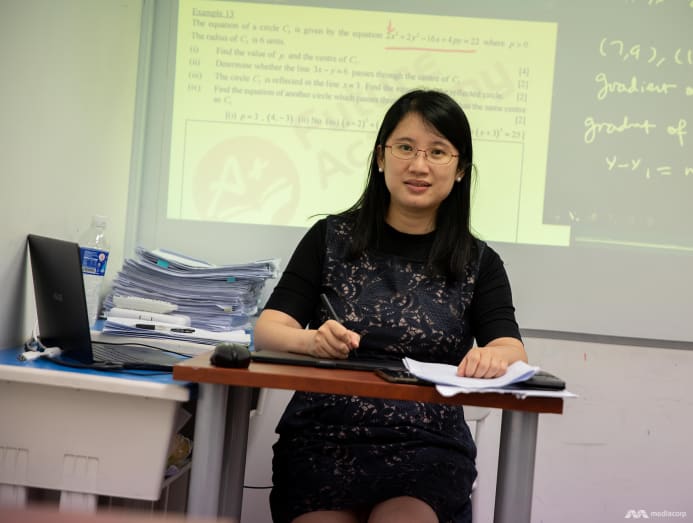
While many of the “elite” primary schools have a structured coaching programme to prepare children for this, neighbourhood primary schools do not and parents may source for such courses offered by tuition centres, Ms Chen added.
Fifty per cent of the centre’s students come for its IP courses, which cost S$4,000 to S$5,000 a year.
She shared that about one in five of these students are high-achieving O-Level takers who prefer to take the IP classes so that they can be exposed to questions that require higher order thinking and goes more in-depth into various topics.
“To me, as a teacher, I think they can survive very well without tuition. But a student told me: ‘I come for tuition, so I can understand the concept very fast. If I explore myself, it might take me a whole day, but if I come for two hours of tuition, I would have learnt everything already,” she said.
But as parents become spoilt for choice with a smorgasbord of programmes in the tuition scene — with one “guaranteeing ‘A’s” in a S$2,888 two-month package, for instance — Mr Clarence Tan, founder of English tuition centre The Learning Board, warns against parents making use of tuition centres to “pump grades” at the very last minute.
Once, a mother came to Mr Tan’s tuition centre in 2018 offering to pay S$4,000 to block off his schedule for a month for one-on-one sessions with her daughter who was about to take the PSLE.
While the offer was enticing, he did not take it up. Tutors who claim that they can produce the desired results under such circumstances may not be totally honest since it is unrealistic, he said.
REINING IN THE MONSTER
Apart from discussing whether private tuition is a boon or bane for students and their parents, the debate also involves a broader discourse on issues such as inequality, privilege, meritocracy and competition.
The problem is that the industry has become overly segmented with unequal access, said Mr Victor Pok, who runs KidsExcel, a social enterprise for the underprivileged, and Pal Learning, a commercially-run tuition centre for the middle-income segment.
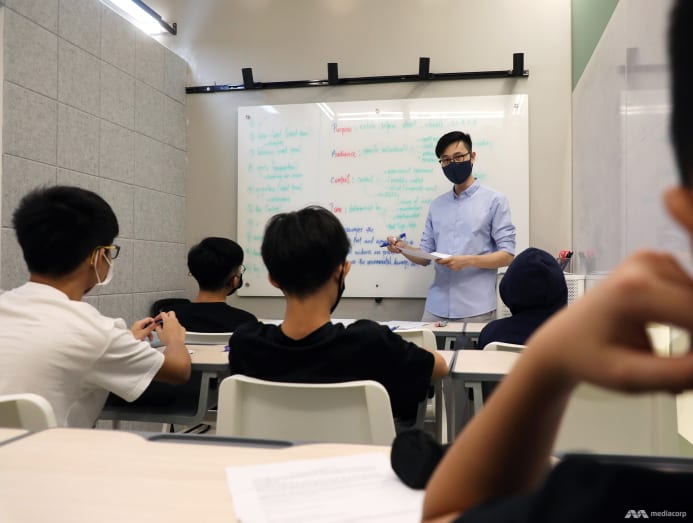
For tuition to play a complementary role in the Singapore education system, costs have to be regulated, so that opportunities can be equalised and market failure managed, said the former physical education and English school teacher.
“Classes for GEP preparation and DSA have gotten out of control and it is impossible to stop as long as parents can afford it,” he said.
Mr Pok said the tipping point came in the 2000s after more independent schools emerged, which opened up a separate track for entry into the top secondary schools.
He said: “It is a very primordial kind of system that affects society as a whole. You have the upper class congregating in elite schools and centres that cater to that social class. Others were excluded simply by price.”
Mr Pok defined premium centres as those that charge between S$250 and above per subject a month. Heartland centres charge around S$180 to S$200 per subject. Then, there are still cheaper ones that try to make a profit through bigger classes.
Online lessons at his for-profit centre cost S$99 a month, and group sizes are capped at five.
Mr Pok also noted that some premium centres practise a discreet policy of rejecting weak students by putting them on a waitlist after making them take certain tests. This is so that they can maintain the centres’ stellar record.
The myriad of offerings by tuition centres to help students in just about any area where demand for it exists — so long as they can afford it — has also created excessive reliance on tuition, along with its implications.
Mr Ong touched on this when he addressed the tuition issue in Parliament in 2019, in response to queries from Members of Parliament following the release of the Household Expenditure Survey that year.
Stating that tuition “may not be necessary and can even be detrimental” if a child is generally coping well academically and understands the fundamentals, Mr Ong said: “Excessive reliance on tuition can diminish the ability for independent learning, deprive students of opportunities to develop self-management skills and promote unhealthy competition.”
REDUCING THE TUITION ADDICTION
One of the first steps towards reducing the reliance on tuition is to address society’s excessive focus on academic grades, Mr Ong noted in his parliamentary response.
He then highlighted that MOE had introduced several policy changes under its “Learn for Life” movement in a bid to strike a balance. They included expanding the number of DSA places in schools, reducing school-based assessments, changes to the PSLE scoring system this year, and the rollout of full subject-based banding in all secondary schools by 2024.
Former MOE curriculum planner Liu Yueh Mei said these are steps in the right direction as the removal of exams open up time and space for broader learning in school, while changes to PSLE scores aim to give parents the transparency that they have been asking for.
Meanwhile, full subject-based banding recognises that each student has his or her strengths and weaknesses, and it may not be necessary for students to take all the subjects at the same level, said Ms Liu, who is the chief executive officer of online teaching and learning space HeyHi and iMath, a Math tutoring app.
Despite such changes to the educational system, the demand for private tuition here doesn’t seem to be waning. Why?
“It is in our DNA. Not just Singapore, but Asians in Australia, the US, UK, Canada are also anxious. They are the ones who will still send their children to enrichment classes,” Ms Liu said.

In response to queries, an MOE spokesperson said that the reforms are part of its efforts to raise the school education system to a new level “over the next five to 10 years”.
“These efforts will take time to bear fruit, even as changing mindsets take time,” the spokesperson added.
Nevertheless, she pointed out that MOE has already seen encouraging signs, such as younger cohorts of students adapting well to the removal of school-based assessments and enjoying their learning in different areas of interest.
“We are confident that together with parents and the wider society, we can give our children greater confidence and joy in learning, and best prepare them not only for examinations but for life ahead,” she said.
Two teachers, who spoke on the condition of anonymity as they were not supposed to speak to the media, continued to highlight the problem of teachers being overburdened with duties other than teaching, such as in event planning.
For example, as COVID-19 had put a stop to mass assemblies, teachers would have to leverage on their own skills or learn from scratch how to pre-record or stream performances and show them over Zoom on occasions like Racial Harmony Day or Chinese New Year.
Said a 31-year-old Chinese teacher at a Secondary School: “These are not skills that a layman would have … We need more help here, and these shouldn’t rest on our shoulders. We are not supposed to be professional entertainers.”
She added that the workload would never be even under such circumstances as the teachers who are more skilled would always be tapped. “When is this going to end?” she said.
(Would the Education Ministry consider doing away with the PSLE or implement later start times for schools to ease the pressure off students? We asked Minister of State for Education Sun Xueling on CNA's Heart of the Matter podcast.)
In its reply, the MOE spokesperson said that teachers are “appraised holistically and recognised for their contributions in all areas of work, including their work in supporting students’ all-round development”.
In terms of administrative responsibilities, much effort has been made to reduce teachers’ involvement through leveraging technology, such as the Parents Gateway platform, and reviewing the provision of manpower support, she said.
“Schools have also been reminded to regularly review their organisation and management systems to ensure teachers’ workload is well managed,” she added.
NO STRAIGHTFORWARD SOLUTION
While the reliance on private tuition of parents in Singapore is not that different from their counterparts in China, many here — especially the younger parents — do not see a need to develop “jiwa”, or “baby chicks”, a term popularised in China referring to children whose schedules are filled with extracurricular classes, thanks to anxious parents.
Housewife Grace Loh, 36, who has two children aged two and seven, said she would only turn to tuition if their self-esteem is affected.
For pharmacist Joen Wong, 36, whose girls are three and six years old, her approach is to not overload her children’s schedules too much as the programme in their preschool is already quite well-rounded. She said she would opt for no tuition as far as possible, and would also steer clear of academic-related enrichment programmes, unless she senses the child's interest in them.
Following the new curbs in China, all centres that offer tutoring on the school curriculum will be registered as non-profit organisations, and they are not allowed to raise money through capital-related activities.
Existing online tutoring firms will be subject to extra scrutiny and after-school tutoring is prohibited during weekends, public holidays and school vacations.
Can Singapore implement similar measures to reduce parents’ reliance on tuition? Doing so would be counterproductive, several experts and industry players told TODAY.
Dr Kelvin Seah Kah Cheng, a lecturer at the National University of Singapore’s economics department whose research focuses on the economics of education, said he does not think that cracking down on tuition this way will necessarily eliminate it.
“It is likely that tuition will continue to exist, with the only difference being that much of these activities will now be pushed underground and perhaps will exist on a somewhat smaller scale than before,” he said.
He added that paradoxically, the move might even increase educational inequality between the rich and poor, since the poor would find it more difficult to afford private tuition. The reduced supply of tuition, coupled with a high demand for it, would just mean that the price of tuition will increase.
Singapore can take a leaf out of South Korea’s experience, he said. South Korea banned tuition in 1980 but the ban was lifted two decades later. Currently, it employs a more sophisticated approach — ordering schools to hold after-school classes and offer free online lessons, as well as imposing a 10pm curfew on tuition centre’s operating hours.
Mr Timothy Joshua Chia-Lee, director of curriculum and student services at The Thought Tailor, an English and General Paper centre, argued that a ban would in fact be detrimental to students. “One fundamental trait of our meritocracy is that our students must and should continue to find that if they wish to work harder and to push themselves more, they should be able to do so outside of school,” he said.
NIE associate professor Jason Tan Eng Thye noted that even though the tuition industry is such a big part of Singapore’s education landscape, its status as a major stakeholder is not openly acknowledged.
He believes that MOE should resolve this uneasy and ambivalent relationship, and stop being under the illusion that mainstream schools are the sole source of information for many students and parents. He noted how some students are not paying attention in class because they have been taught the topics in their tuition classes ahead of time.
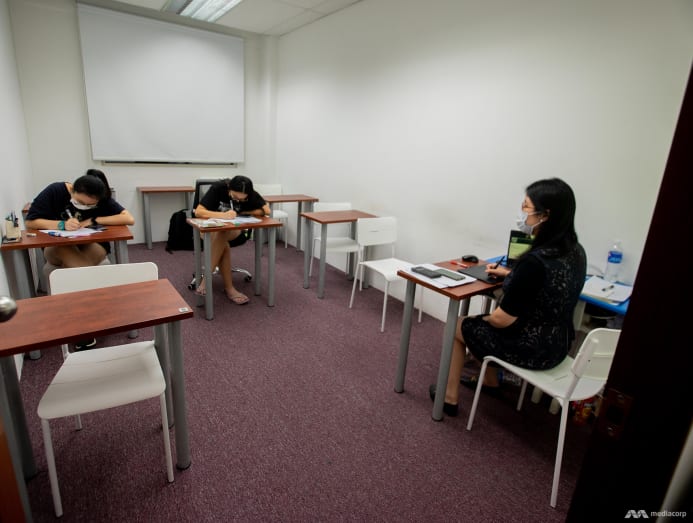
In a sign that the ministry is paying closer attention to the issue, teachers have been barred from giving private tuition without approval. Previously, they could give up to six hours of private tuition a week.
The MOE spokesperson said that with effect from Jan 1, teachers are required to seek approval for paid part-time lecturing or teaching, which includes paid tuition.
This came about as the guideline on participating in part-time lecturing or teaching, including paid tuition, not exceeding six hours a week has been removed following a review by the Public Service Division.
“The Public Service has existing guidelines on public officers participating in outside activities to ensure that their outside activities do not distract them from their core duties,” she added.
Mr Shawn Cheong, lead coordinator at Schtutors, a home tuition agency matching only MOE-accredited teachers, said that sometime late last year, he received a slew of requests from listed tutors requesting to be deregistered from the platform.
Mr Cheong said that currently, only 20 to 25 per cent of the over 5,500 teachers listed on Schtutors’ platform are current MOE teachers, down from about 60 per cent in 2013, when more than 3,000 teachers were listed.
WHERE PARENTS CAN DRAW THE LINE
At the end of the day, the amount of tuition that a child needs — or doesn’t — may well boil down to his or her parents’ mindset.
As a father of two boys aged one and three, business owner Jeremy Ko, 33, confessed that he is already feeling the pressure of having to balance his belief in giving his children a childhood of self-discovery with his resolve to ensure that his child does not fall too far behind.
“My kid’s teachers in childcare say his Chinese and English are both very good, but I also compare him to my business partner’s kid who is a few months younger but can do addition and read more words than mine,” he said.
For more news like this, visit todayonline.com.
But after giving it some thought, Mr Ko has decided that he will not be sending his child for preparatory classes designed to equip preschool children with academic skills before they enter Primary One.
“The values that you are teaching the kid (by sending him for tuition or enrichment) is that money can be used to solve problems and that parents cannot help too much in their studies,” he said.
Mr Ko can’t say for sure if he would send his child for tuition, though. “I cannot imagine if my kid starts doing badly in school,” he said.












